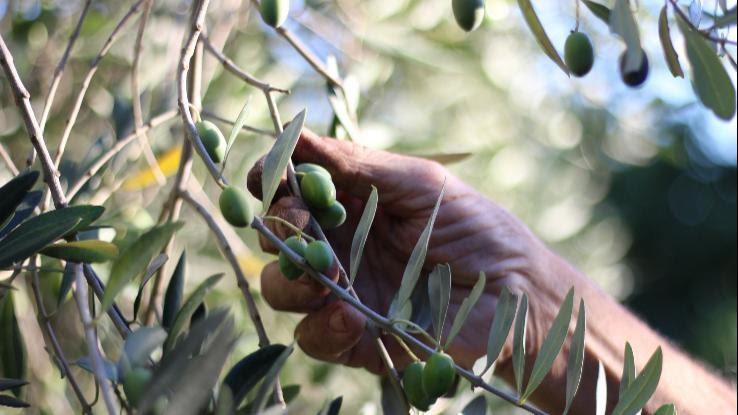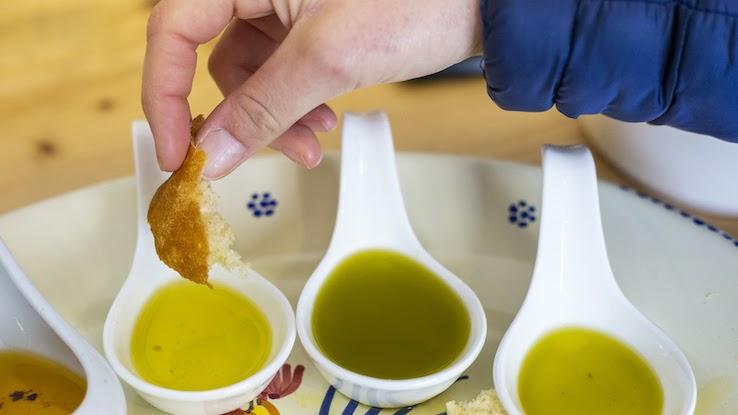What Ingredients Are in a Beef Olive

Want to enjoy better heart health, reduce your risk of developing dementia, boost your immune system, limit your likelihood of developing diabetes or even lower your risk of getting cancer? Eat more polyphenols. These natural antioxidants — molecules that fight off disease-causing compounds in your body — have a wide variety of beneficial health effects. But just what are they, and how do you start getting more of them?
Polyphenols are found mainly in fruits, vegetables, nuts, seeds, herbs and whole-grain products. You can also find them in many dietary and nutritional supplements. However, it's generally best to obtain them by eating whole foods, which may contain different polyphenols that work more effectively to improve your health when consumed together. One of the best places to find them? Olive oil. Learn more about these helpful compounds and what makes olive oil such a rich source of polyphenols.
What Exactly Are Polyphenols?

There are hundreds of different polyphenols, and the medical community generally divides them into a few main groups based on their chemical structures. Flavonoids, such as quercetin and catechins, are the largest group of polyphenols and are found in foods and drinks such as tea, onions and dark chocolate. A smaller percentage of polyphenols are called phenolic acids, which are abundant in cereal grains, legumes, herbs and fruits. The remaining types of polyphenols include polyphenolic amides (like capsaicinoids — the compounds that give spicy peppers their heat). If you've read a bit about superfoods, you might also be familiar with some of the better-known polyphenols like resveratrol in red wine, ellagic acid in berries and curcumin in turmeric.
Polyphenols have particular characteristics that make them quite beneficial for your health. First, as mentioned, they have antioxidant properties. This means they neutralize unstable atoms called free radicals that contribute to aging; cause damage to cells; and increase your risk of developing chronic health conditions such as cancer, heart disease and diabetes.
Polyphenols are also natural anti-inflammatories. Those anti-inflammatory properties are key to the health-related benefits of foods rich in polyphenols. Many studies, including "Chronic inflammation in the etiology of disease across the lifespan" published in the December 2019 edition of Nature Medicine, have recognized chronic inflammatory diseases as responsible for a large percentage of various types of death worldwide. Chronic inflammatory diseases many of us are familiar with include:
- Heart disease
- Strokes
- Cancer
- Diabetes mellitus
- Kidney disease
- Non-alcoholic fatty liver disease
- Neurodegenerative and autoimmune diseases
Where Does Olive Oil Play a Role?

If you're looking for a simple way to get more polyphenols to help lower your blood sugar, lower your risk of heart disease, prevent blood clots, protect against cancer, promote healthy digestion and boost brain function, you can't go wrong by choosing high-quality extra virgin olive oil (EVOO). EVOO is especially rich in the polyphenols hydroxytyrosol and tyrosol. Those polyphenols deliver substantial health benefits and are also a core part of the character of olive oil itself.
In a study called "Biological Relevance of Extra Virgin Olive Oil Polyphenols Metabolites" published in Antioxidantsin 2018, polyphenols specifically were described as playing a key role in creating the beneficial effects on human health that we've come to associate with olive oil. According to the study, they also "possess antimicrobial, anticancer, antioxidant and anti-inflammatory properties." Interestingly, polyphenols are also what give olive oil its simultaneous bitter and fruity flavors.
Researchers found that over 30 different combinations of polyphenols — called phenolic compounds — were present in EVOO. Just what compounds might be found in any particular olive oil product depended on the types of olives used, the region where the olives were grown, the agricultural techniques used to grow the olives, the olives' level of maturity at harvest and the ways the oil was processed.
Finding High-Polyphenol Olive Oil

It's clear that adding polyphenol-rich olive oil to your diet can have a range of positive health effects. But is there a way to maximize your polyphenol consumption by choosing olive oils with a higher content than others?
As odd as it might sound, you'll somewhat be able to taste polyphenol-rich olive oil. As a general rule, polyphenols are at their highest in olives that aren't fully ripe. A slightly under-ripe olive harvested from an olive tree in the Mediterranean would taste bitter and pungent. Olive oils high in polyphenols — referred to as high-phenolic olive oils — are often the most bitter and pungent-tasting. Olive oils rich in polyphenols may also include such a claim on their label, particularly if that characteristic is part of their marketing emphasis.
In the United States, the Food and Drug Administration (FDA) has allowed edible oil producers to make qualified health claims related to consuming oleic acid in edible oils, which include olive oils. The FDA doesn't regulate or require labeling of polyphenol content in olive oil, though. In the European Union, Regulation 432/2012 allows olive oils with more than 250 mg/kg of polyphenol content to include health-related claims on their packaging. You may want to contact specialty import shops in your area or online to find recommendations about European olive oils bearing this labeling.
The olive oil producers' association ARISTOIL was formed by producers in the Mediterranean region. This organization has sought to develop a certification program focused on olive oils with the highest phenolic content. Producers interested in applying for certification under the program must demonstrate phenolic content of 500 mg/kg — twice the level that qualifies under the European Union's labeling standard. ARISTOIL also operates a marketplace for the highest phenolic content olive oils. To become available in that marketplace, oils must test with at least 500 mg/kg of phenolic content.
If you want to prioritize phenolic content in your olive oils in order to enjoy the significant health benefits of polyphenols, examine the labels of the highest-quality olive oils available in your local grocery markets. If — and this will likely be the case at general and neighborhood grocery stores — the polyphenol content isn't labeled, you should contact a specialized vendor in your area and ask for their selection of high-phenolic EVOO. They may be able to offer products certified by ARISTOIL.
Resource Links:
https://www.mayoclinic.org/healthy-lifestyle/nutrition-and-healthy-eating/multimedia/antioxidants/sls-20076428
https://diet.mayoclinic.org/diet/eat/olive-oil-health-benefits?xid=nl_MayoClinicDiet
https://www.sciencedirect.com/science/article/pii/S2352873718300544
https://utswmed.org/medblog/polyphenols/
https://www.ncbi.nlm.nih.gov/pmc/articles/PMC2835915/
https://www.ncbi.nlm.nih.gov/pmc/articles/PMC6032343/
https://www.ncbi.nlm.nih.gov/pmc/articles/PMC6571782/
https://pubmed.ncbi.nlm.nih.gov/30469520/
https://www.nature.com/articles/s41591-019-0675-0#:~:text=Indeed%2C%20chronic%20inflammatory%20diseases%20have,disease%2C%20non%2Dalcoholic%20fatty%20liver
https://www.fda.gov/food/cfsan-constituent-updates/fda-completes-review-qualified-health-claim-petition-oleic-acid-and-risk-coronary-heart-disease
https://aristoleo.com/aristoil-interreg-med-programme/
Source: https://www.symptomfind.com/nutrition-supplements/what-is-polyphenol?utm_content=params%3Ao%3D740013%26ad%3DdirN%26qo%3DserpIndex
0 Response to "What Ingredients Are in a Beef Olive"
Post a Comment